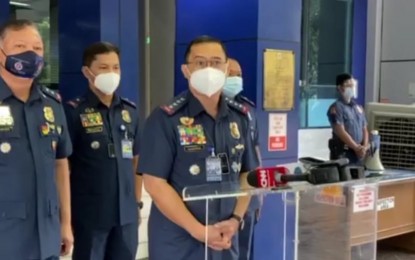
PNP chief, Gen. Archie Gamboa (center). (Screengrab from video)
MANILA – The restoration of the death penalty will put an end to the Philippines being an attractive location for illegal drug activities, especially for foreigners, the country's top cop said Wednesday.
“The PNP believes that with this kind of imposition, there would be a deterrence on crime and then we if we compare it with other countries, especially when we apprehend foreigners, the first question is why do they do it here, because they are in a way convenient in the absence of a death penalty,” Philippine National Police (PNP) chief, Gen. Archie Gamboa, told reporters in Camp Crame, on the sidelines of the destruction of 800 kilograms of shabu confiscated in Bulacan.
This came as President Rodrigo Duterte, in his fifth State-of-the-Nation Address (SONA), renewed his call for Congress to pass a measure restoring the death penalty for heinous crimes linked to illegal drugs.
“It has been the stand of the PNP that we are fully supportive of the imposition of the death penalty. Besides, the campaign of the Duterte administration against illegal drugs is unprecedented and this can't just be compared with any other administration," he added.
After Wednesday's event, Gamboa said next to be destroyed are 300 kilograms of shabu seized in Cavite and another 300 kilograms of shabu confiscated in Makati City, in compliance with a Supreme Court order for these to be destroyed immediately after being presented as pieces of evidence in drug cases.
Meanwhile, Interior Secretary Eduardo Año said law enforcement authorities will run after both big-time and small-time illegal drug personalities, as he debunked claims that the revival of the death penalty will only target the poor.
“Big or small we will run after them with their only option is to surrender," he said.
He added that the measure has been long overdue as the Philippines is lagging behind its Asian neighbors in terms of cracking down on illegal drugs because of the absence of the death penalty.
China and Indonesia are among countries that have the death penalty as the harshest punishment for drug offenses.
In 2011, three overseas Filipino workers (OFWs) were executed in China for drug smuggling through lethal injection, despite appeals from the Philippine government.
In 2010, another OFW, Mary Jane Veloso, was arrested for carrying heroin in a suitcase in Indonesia. Her execution set in April 2015 was put on hold after Indonesian authorities heeded Manila's plea for her to testify in the case against her recruiters.
In 1996, Republic Act 8177 was passed, prescribing the use of lethal injection as the method of carrying out capital punishment.
The death penalty was abolished through Republic Act 9346 signed by former president Gloria Macapagal-Arroyo in 2006. It downgraded the maximum penalty for crimes to reclusion perpetua (imprisonment of up to 40 years) and life imprisonment. (PNA)
